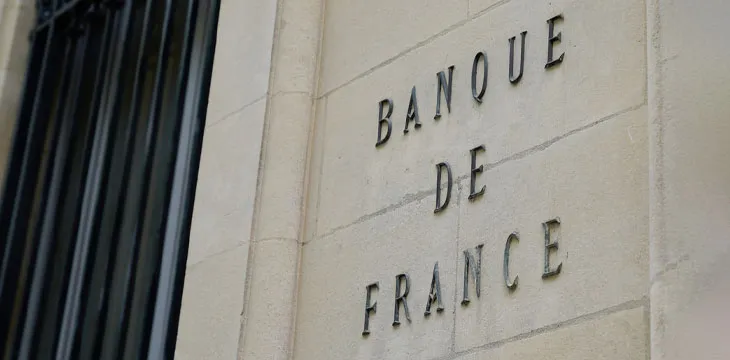|
Getting your Trinity Audio player ready...
|
The Banque de France published a detailed discussion paper this week on decentralized finance (DeFi), exploring the risks involved in the area and potential regulatory changes that could mitigate them.
The discussion paper was co-authored by Olivier Fliche, Julien Uri and Mathieu Vileyn, members of the Fintech-Innovation Hub at the Autorité de contrôle prudentiel et de résolution (ACPR), the Banque de France-backed organization responsible for the supervision of banking and insurance institutions and their intermediaries.
The paper begins by defining DeFi, which it states is more accurately described as “disintermediated finance,” as a set of digital asset services similar to financial services but carried out without the intervention of an intermediary and heavily reliant on smart contracts.
This, it claims, comes with inherent risks and limitations, one being that decentralized governance is, in reality, sometimes highly centralized, meaning it’s often the case that governance tokens are concentrated in the hands of a few players who hold power over the protocol and can make decisions that are detrimental to minority owners.
Along with this fundamental risk, the paper identifies further causes for concern related to, amongst other things, potential flaws in the smart contract code, the vulnerabilities of blockchain infrastructure to attack, money laundering, and the risks associated with stablecoins.
To mitigate these issues, it recommends improved regulation designed specifically for the unique challenges of DeFi: “The main idea developed in this paper is that the regulation of disintermediated finance cannot simply replicate the systems that currently govern traditional finance. On the contrary, regulations must take into account the specific features of DeFi.”
Such regulation, the paper explains, should not be a monolithic block but rather a combination of traditional financial regulations and regulations inspired by other economic sectors.
Proposed regulation
Regarding changes to current and incoming regulations, the paper proposes that blockchains be “certified” according to minimum security standards, which would entail certification of computer code, a minimum number of validators, and a cap on validation capacity concentration.
The paper proposed that a certification mechanism could also be used to strengthen the security of smart contracts’ computer code, on which DeFi relies. Certification would be obtained following an auditing process of the contracts and code; it should be withdrawable; and would only be granted for a limited time, to be renewed after any significant change to the code.
Another key concern of the paper was that players exercising control over sensitive services should be required to incorporate. This would mean assigning a legal statute to the intermediaries that allow access to DeFi services, such as “decentralized autonomous organizations” (DAO), making them incorporate and thus allowing for increased supervision and control—in theory, improving customer protection.
According to the paper, the first step to achieving these DeFi sector improvements would be to “explicitly extend the provisions of the European MiCA Regulation to decentralized financial intermediaries.”
The Markets in Crypto-Assets (MiCA) regulation, which has been in the works since September 2020 and looks set to come into force in early 2024, will bring with it a raft of new legislation aimed at addressing unbacked digital assets as well as stablecoins, exchanges, and wallets. The law is intended to bridge the remaining gaps in EU legislation created by digital assets, allowing industry players to operate without legal ambiguity and authorities to better govern the area.
Currently, DeFi intermediaries do not fall within the scope of MiCA regulation and what it considers crypto asset service providers (CASPs)—companies that help users control, trade, or store their digital assets—as the regulation does not apply to services provided in a fully decentralized manner without any intermediary, so either the CASP definition would need to be expanded, or extra allowance made for DeFi intermediaries.
An area MiCA has a lot to say about is stablecoins, a concern it shares with the paper’s authors at the ACPR Fintech-Innovation Hub.
Stablecoins
The Banque de France discussion paper explains that stablecoins are essential to the functioning of DeFi because “they are the settlement assets used for transactions” and “they are DeFi’s main point of contact with the real world.”
Under MiCA, stablecoin issuers will be required to hold a 1:1 reserve of assets, while those containing the coins must be entitled to claim their true value from the issuer without charge.
However, as mentioned, the MiCA regulation does not apply to decentralized services or cover stablecoins issued or used by such protocols. This gap, the paper proposes, should be bridged by including any stablecoin used or created by a decentralized service within the remit of MiCA’s incoming stablecoin regulations.
The authors of the paper state that it is not intended to provide an exhaustive view of all DeFi issues and does not reflect an official ACPR position on the matter. Instead, it aims to develop an analysis of DeFi and how it can be effectively regulated.
The paper concludes with a consultation questionnaire asking for feedback from relevant industry stakeholders on the discussion and proposed changes, to be completed by May 19, 2023.
Watch: BSV On-chain Ecosystem Development in Europe

 09-11-2025
09-11-2025 





